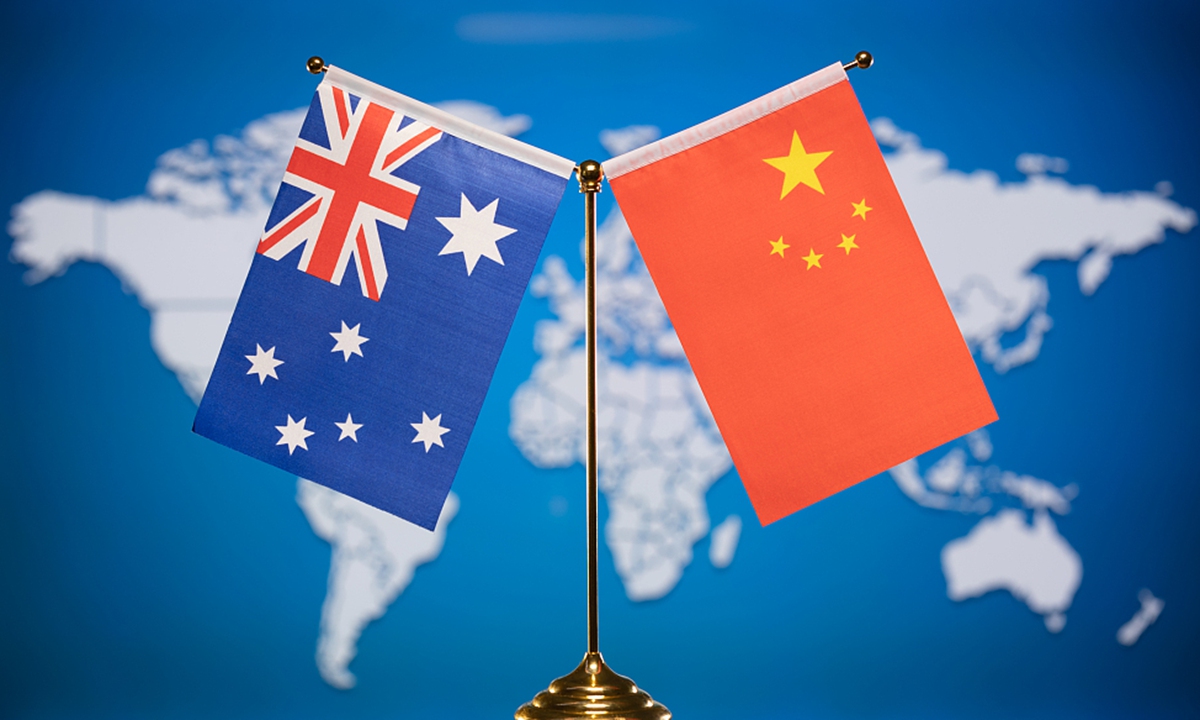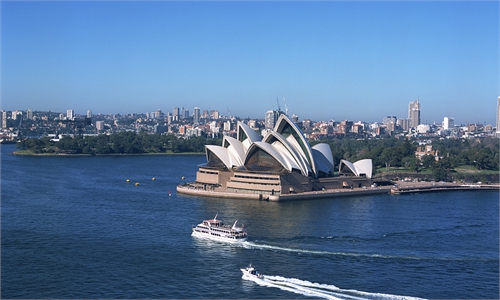Morrison should learn from past for China reset

China Australia. Photo: VCG
Amid strained China-Australia relations, Australian Prime Minister Scott Morrison said on Monday he is ready and willing to meet with the top Chinese leader, but only if there are no preconditions to holding the talks. Previously, Dan Tehan, Australia's new trade minister extended an olive branch to his Chinese counterpart, saying he wants "very constructive engagement" with Beijing in a bid to repair worsening China-Australia relationship.The positive signal from those remarks is that Australia hopes to make a new beginning with China in the new year. However, what is important here is not what Australia has said, but what real actions it will take.
China-Australia relations have fallen off a cliff, reaching the rock bottom since official diplomatic relations were formally established in 1972. The bilateral trade and people exchanges have been impacted severely. But over the past year, we have noticed that some Australian senior officials, including the prime minister, send some signals of hope for dialogue. But at the same time they have been taking actions that have continually hampered China-Australia relations.
Canberra is still stressing that Beijing is to blame for the breakdown of China-Australia relations. On the one hand, Morrison said he is open to talks with Beijing, on the other, he emphasized that he refuses to cede any ground over "Chinese grievances" with Australia in return for restarting diplomatic dialogues. However, the fact is Australia is the culprit for the broken bilateral ties.
Australia was the first country to ban Chinese high-tech company Huawei from the 5G rollout using security as an excuse. It followed the US to declare China's South China Sea claims "illegal," and took the lead to call for an independent investigation into the origins of COVID-19. These hostile actions toward China have won Australia a label as the vanguard for the US' anti-China campaign.
A long-time diplomatic dilemma facing Australia was how to strike a balance between China, its largest trading partner, and the US, its security ally. But now, Australia regards China's rise its biggest diplomatic challenge. Its diplomatic focus has shifted from maintaining a balance between Beijing and Washington to working far more closely with the US to totally contain China.
Australia's domestic conservative politics have exacerbated the country's hostility toward China. Flourishing right-wing conservative forces, growing domestic populism, and white supremacy have given rise to opportunism in Australian politics. For anti-China politicians, hyping up the "China threat" theory easily attracts public attention. Under such an unhealthy atmosphere, Australia's attitude toward China has deteriorated sharply.
The prospects for China-Australia relations are bleak. James Laurenceson, director of the Australia-China Relations Institute at the University of Technology Sydney, said the problem for Canberra now is that, "relatively simple, low-cost options for resetting the relationship have passed us by."
I agree with his view. But, given the complementarity between China and Australia and the significance of the bilateral relations to each country, it's never too late to start on resetting the ties.
The ball is in Australia's court. The prerequisite for a reset in China-Australia relations is that Australia can take actual steps to promote improvements, stopping provoking and smearing China over a string of issues that concern China's core interests. Only in this case can there be a possibility for a proper reset in the China-Australia relationship.
Whether or not a reset can be materialized is a big test for the Morrison administration. First of all, it tests the Australian government's ability to make deep reflections. In fact, there have been many debates and discussions in Australia over the past year. What are Australia's national interests? Is the current China policy in line with Australia's national interests? The Morrison administration has to make serious self-introspections on these questions.
Second, it tests the Australian government's ability to correct deviations. If Australia wants to adjust its China policy, it will face great pressure from both Washington and domestic conservative forces. Can it withstand the pressure to promote a turnaround in relations with China based on Australia's national interests?
It's normal that there are differences between China and Australia. But the point is whether or not the two countries can communicate again in a proper and pragmatic manner to work together and fix the relationship based on common interests.
Morrison on Monday also said he had consulted former prime ministers John Howard and Kevin Rudd on Australia's strained relationship with China, and he is always "open to those who are experienced in these areas." Howard in December urged Morrison to repair relations with China while Rudd in September criticized the Morrison government's "rolling crises" with Beijing. During their tenures, China-Australia relations also witnessed twists and turns, but both of them managed to steer bilateral relations in the right direction because of their pragmatism.
Morrison should learn from his predecessors. He should learn from them how to promote China-Australia relations with a pragmatic attitude, develop bilateral ties based on national interests and mutual respect, and seek common ground while reserving differences.
The article was compiled based on an interview with Guo Chunmei, an expert on Australian studies with the China Institutes of Contemporary International Relations. opinion@globaltimes.com.cn



